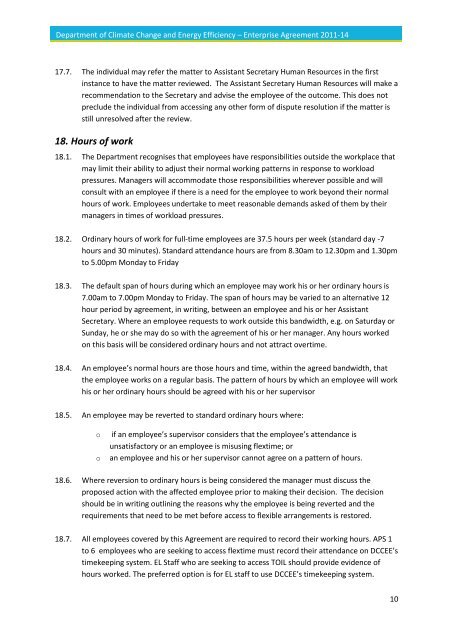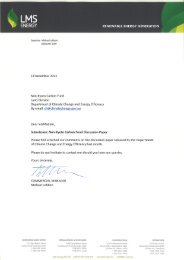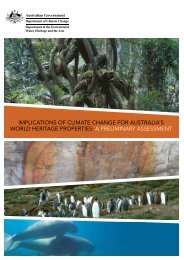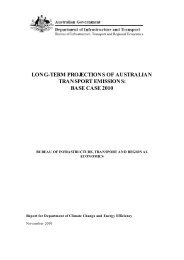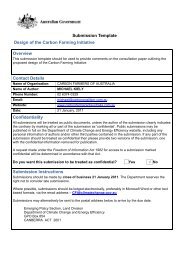Enterprise Agreement 2011-14 - Department of Climate Change
Enterprise Agreement 2011-14 - Department of Climate Change
Enterprise Agreement 2011-14 - Department of Climate Change
Create successful ePaper yourself
Turn your PDF publications into a flip-book with our unique Google optimized e-Paper software.
<strong>Department</strong> <strong>of</strong> <strong>Climate</strong> <strong>Change</strong> and Energy Efficiency – <strong>Enterprise</strong> <strong>Agreement</strong> <strong>2011</strong>-<strong>14</strong><br />
17.7. The individual may refer the matter to Assistant Secretary Human Resources in the first<br />
instance to have the matter reviewed. The Assistant Secretary Human Resources will make a<br />
recommendation to the Secretary and advise the employee <strong>of</strong> the outcome. This does not<br />
preclude the individual from accessing any other form <strong>of</strong> dispute resolution if the matter is<br />
still unresolved after the review.<br />
18. Hours <strong>of</strong> work<br />
18.1. The <strong>Department</strong> recognises that employees have responsibilities outside the workplace that<br />
may limit their ability to adjust their normal working patterns in response to workload<br />
pressures. Managers will accommodate those responsibilities wherever possible and will<br />
consult with an employee if there is a need for the employee to work beyond their normal<br />
hours <strong>of</strong> work. Employees undertake to meet reasonable demands asked <strong>of</strong> them by their<br />
managers in times <strong>of</strong> workload pressures.<br />
18.2. Ordinary hours <strong>of</strong> work for full-time employees are 37.5 hours per week (standard day -7<br />
hours and 30 minutes). Standard attendance hours are from 8.30am to 12.30pm and 1.30pm<br />
to 5.00pm Monday to Friday<br />
18.3. The default span <strong>of</strong> hours during which an employee may work his or her ordinary hours is<br />
7.00am to 7.00pm Monday to Friday. The span <strong>of</strong> hours may be varied to an alternative 12<br />
hour period by agreement, in writing, between an employee and his or her Assistant<br />
Secretary. Where an employee requests to work outside this bandwidth, e.g. on Saturday or<br />
Sunday, he or she may do so with the agreement <strong>of</strong> his or her manager. Any hours worked<br />
on this basis will be considered ordinary hours and not attract overtime.<br />
18.4. An employee’s normal hours are those hours and time, within the agreed bandwidth, that<br />
the employee works on a regular basis. The pattern <strong>of</strong> hours by which an employee will work<br />
his or her ordinary hours should be agreed with his or her supervisor<br />
18.5. An employee may be reverted to standard ordinary hours where:<br />
o if an employee’s supervisor considers that the employee’s attendance is<br />
unsatisfactory or an employee is misusing flextime; or<br />
o an employee and his or her supervisor cannot agree on a pattern <strong>of</strong> hours.<br />
18.6. Where reversion to ordinary hours is being considered the manager must discuss the<br />
proposed action with the affected employee prior to making their decision. The decision<br />
should be in writing outlining the reasons why the employee is being reverted and the<br />
requirements that need to be met before access to flexible arrangements is restored.<br />
18.7. All employees covered by this <strong>Agreement</strong> are required to record their working hours. APS 1<br />
to 6 employees who are seeking to access flextime must record their attendance on DCCEE’s<br />
timekeeping system. EL Staff who are seeking to access TOIL should provide evidence <strong>of</strong><br />
hours worked. The preferred option is for EL staff to use DCCEE’s timekeeping system.<br />
10


